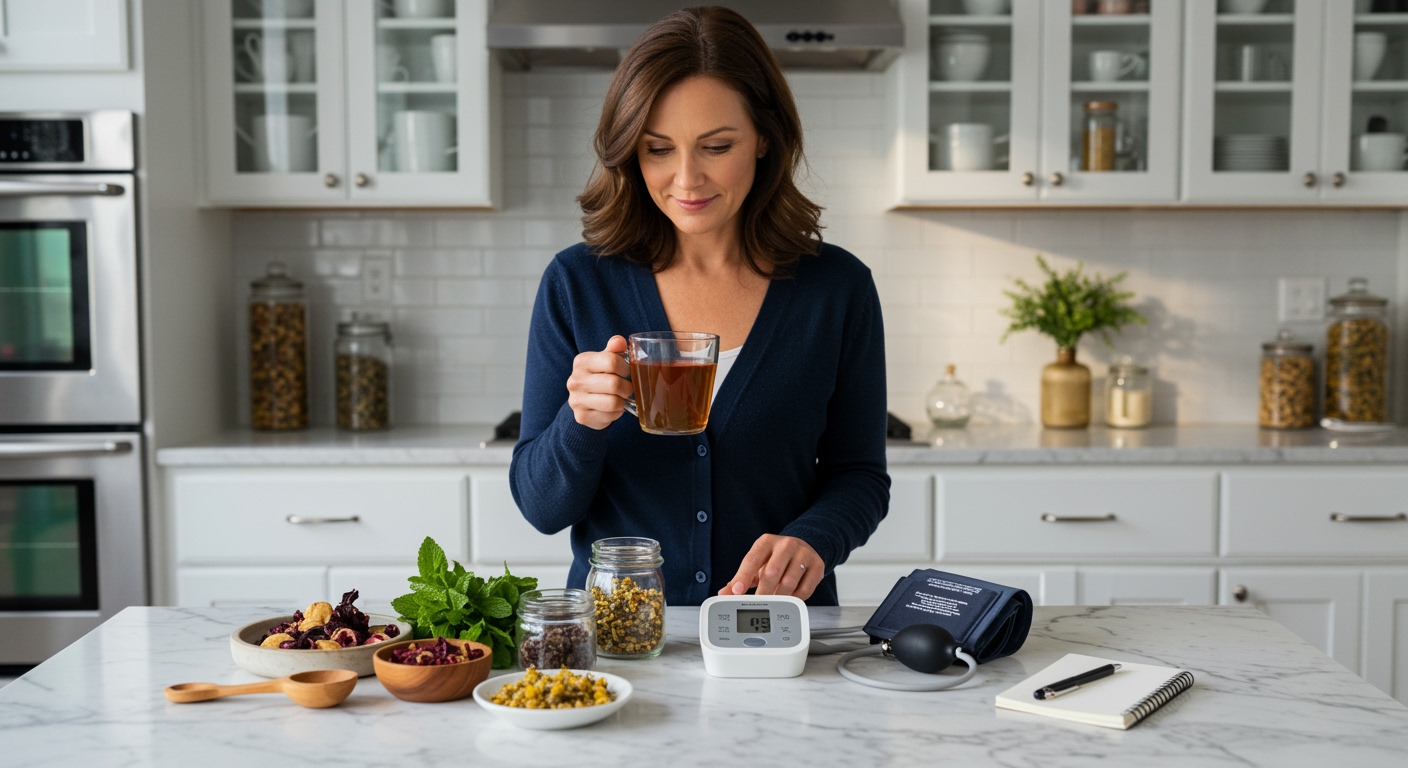✪ Key Takeaway: Herbal teas like hibiscus, green tea, and chamomile can help lower blood pressure through natural compounds that relax blood vessels.
Introduction
Your morning cup of herbal tea might be doing more than just warming your soul.
You probably reach for herbal tea when you want to relax or unwind after a long day. But you might wonder if that soothing cup could actually help manage your blood pressure naturally.
Hi, I’m Abdur, your nutrition coach and today I’m going to explain exactly how herbal teas affect your blood pressure and which varieties offer the most cardiovascular benefits.
How Do Herbal Teas Actually Lower Blood Pressure?
Herbal teas work through several biological mechanisms that directly impact your cardiovascular system.
The most important mechanism involves vasodilation, which means your blood vessels relax and widen. When your arteries and veins expand, blood flows more easily through them with less pressure against the vessel walls.
Many herbal teas contain natural compounds called flavonoids and polyphenols. These plant chemicals help your body produce more nitric oxide, a molecule that signals your blood vessels to relax.
Some herbs also act as natural diuretics, helping your kidneys remove excess sodium and water from your bloodstream. Less fluid in your circulatory system means lower pressure overall.
Additionally, certain herbal compounds can block calcium channels in your heart and blood vessel muscles. This blocking action prevents excessive muscle contraction, keeping your cardiovascular system more relaxed.
✪ Fact: Research shows that regular herbal tea consumption can reduce systolic blood pressure by 3-7 mmHg on average.
Which Herbal Teas Provide The Best Blood Pressure Benefits?
Hibiscus tea stands out as the most researched and effective herbal tea for blood pressure management.
Multiple clinical studies show that drinking hibiscus tea daily can reduce both systolic and diastolic blood pressure significantly. The deep red petals contain anthocyanins and other antioxidants that specifically target cardiovascular health.
Green tea offers impressive blood pressure benefits through its high concentration of catechins, particularly EGCG. These compounds improve endothelial function, which is how well your blood vessel lining works.
Chamomile tea provides gentle blood pressure support through its apigenin content. This flavonoid helps reduce inflammation in your blood vessels while promoting overall relaxation.
Hawthorn tea has been used traditionally for heart health and contains compounds that strengthen heart muscle contractions while dilating coronary arteries. Oolong tea falls between green and black tea in processing and offers moderate blood pressure benefits through its unique polyphenol profile.
✪ Pro Tip: Steep hibiscus tea for 5-7 minutes to extract maximum blood pressure-lowering compounds.
How Much Herbal Tea Should You Drink For Blood Pressure Effects?
The optimal dosage varies depending on which herbal tea you choose and your individual health status.
For hibiscus tea, research suggests drinking 2-3 cups daily provides the most significant blood pressure reduction. Each cup should contain about 1-2 teaspoons of dried hibiscus petals steeped in hot water.
Green tea shows benefits at 3-4 cups per day, but you need to consider its caffeine content. Too much caffeine can actually raise blood pressure in sensitive individuals.
Chamomile tea is gentler and can be consumed throughout the day without concern. Most people benefit from 2-4 cups daily, especially in the evening when its relaxing properties support better sleep.
Timing matters as much as quantity. Drinking herbal tea between meals allows for better absorption of beneficial compounds. Avoid adding sugar or artificial sweeteners, as these can counteract the cardiovascular benefits.
Remember that consistency is key. You need to drink herbal tea regularly for several weeks to see measurable changes in your blood pressure readings.
✪ Note: Start with one cup daily and gradually increase to assess your individual tolerance and response.
Are There Any Risks Or Side Effects To Consider?
While herbal teas are generally safe, certain interactions and precautions deserve your attention.
Hibiscus tea can interact with some blood pressure medications, potentially causing your pressure to drop too low. If you take ACE inhibitors or diuretics, consult your healthcare provider before adding hibiscus to your routine.
Green tea contains caffeine, which can cause jitters, insomnia, or anxiety in sensitive individuals. The caffeine content can also interfere with certain medications and may temporarily raise blood pressure in some people.
Some people experience allergic reactions to specific herbs. Chamomile, for example, can trigger reactions in people allergic to ragweed, chrysanthemums, or other plants in the daisy family.
Pregnant and breastfeeding women should avoid hibiscus tea completely, as it may affect hormone levels and uterine contractions. Always check with your healthcare provider about herbal tea safety during pregnancy.
If you have low blood pressure already, drinking large amounts of blood pressure-lowering herbal teas could make you feel dizzy or lightheaded.
✪ Pro Tip: Monitor your blood pressure regularly when starting any new herbal tea regimen to track your response.
The Bottom Line
Herbal teas can definitely help lower blood pressure through natural compounds that relax blood vessels and support cardiovascular health.
Small daily habits like drinking herbal tea create the foundation for lasting health improvements that no quick fix can match. The key is choosing the right varieties, drinking them consistently, and being aware of any potential interactions with medications or health conditions.
I would love to hear about your experience with herbal teas and blood pressure management. Have you noticed any changes in your readings after incorporating these natural remedies? Share your thoughts and questions in the comments below.
References
At NutritionCrown, we use quality and credible sources to ensure our content is accurate and trustworthy. Below are the sources referenced in creating this article:
- PMC: The Effect of Hibiscus sabdariffa on Blood Pressure
- PMC: Tea Consumption and Cardiovascular Disease Risk
- Healthline: Tea to Lower Blood Pressure
- Medical News Today: Morning Drink for High Blood Pressure





